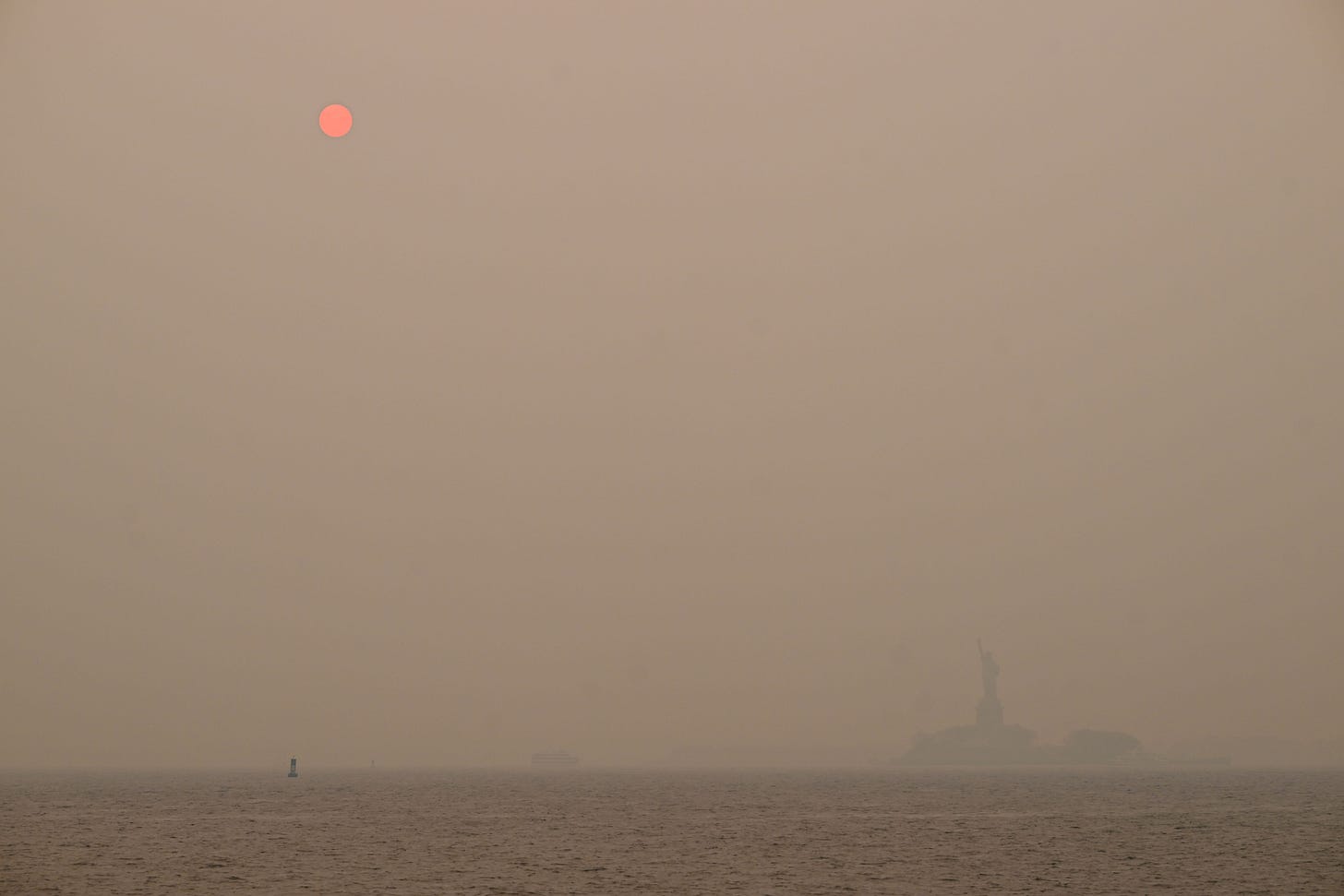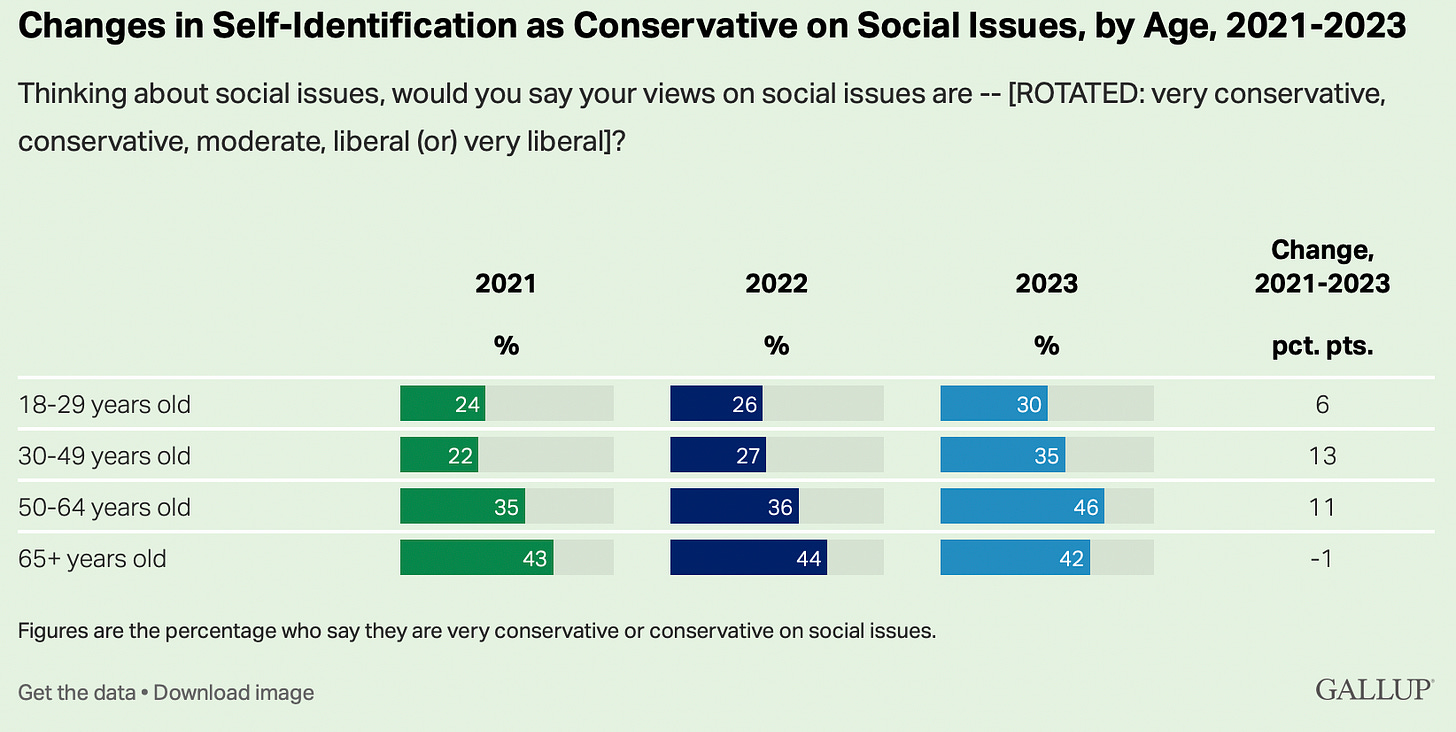TL(PM) DIGEST: Blame Canada!
Plus starvation in Sudan, rising social conservatism, and SpaceX troubles may delay NASA's lunar landing plans

1. Canada burns, America chokes
What happened? Hundreds of wildfires in Canada continue to burn, with smoke and haze drifting over the northeastern United States and causing air quality to reach hazardous levels.
Why does it matter? The New York Times reports yesterday’s level of air pollution in New York City was one of the worst on record—even “higher than the worst day in San Francisco after major wildfires in 2018.”
The small particles measured by the sensors—each about a 30th as wide as a human hair—are dangerous to human health because they are tiny enough to penetrate into the lungs and bloodstream. The Environmental Protection Agency closely tracks pollution of this type from smokestacks and vehicles.
Thirty-five micrograms of the particles per cubic meter of air is considered a safe average level in the air for one day, according to the agency. Wednesday’s average level in seven stations across the city was 377, nearly 11 times as much as that threshold.
TLP’s take: Although climate change didn’t directly cause these wildfires, scientists have warned for years that rising global temperatures fuel dangerously high heat waves and increase the risk of fires like those in Canada. It’s clear that no place is relatively safe from these effects and that governments in capitals like Ottawa and Washington need to make serious national emergency and response plans to help their citizens deal with the effects of global warming on local communities—not fight niche political battles over climate policy in global summits.
2. Sudanese starve as armed factions fight
What happened? The Wall Street Journal reports that ordinary Sudanese face shortages of food and lack access to cash as the country’s two main armed factions slug it out in the streets of Khartoum and elsewhere across Sudan:
Nearly eight weeks into a lethal battle for power between Sudan’s top two generals, lack of food and drinking water has created a hunger emergency for many of the country’s 46 million people. The immediate violence of the war is compounded by the near-collapse of trade and banking services that are run almost entirely from the capital Khartoum and Omdurman, its twin city across the Nile River.
…
Millions more have lost access to their savings and can’t pay for food, water or transport, a tragic knock-on effect of turning a capital area that once housed some five million people and most of the countries’ large businesses into a battlefield. In the more peaceful Red Sea city of Port Sudan, vessels packed with essentials like sugar, rice and wheat won’t unload their cargo because importers lack the cash to pay for it.
Why does it matter? Beyond the immediate and disastrous humanitarian consequences for ordinary Sudanese, the effects of the fighting are starting to spill over Sudan’s own borders:
The blockages in Sudan are also worsening hunger in neighboring South Sudan, Chad and the Central African Republic, which import much of their food and fuel via Sudan. These countries have taken in more than 120,000 Sudanese refugees, many of whom arrived with little more than the clothes on their backs in already struggling communities.
TLP’s take: At least eight attempts by the United States and Saudi Arabia to broker temporary cease-fires that would at least allow humanitarian aid to flow into Sudan have failed. But that's only reason to for the two countries to keep trying, even if the chances of success still appear slim.
3. Americans are more conservative and moderate on social issues than liberal
What happened? Gallup reports new time series data showing an increase in social conservatism in the United States, reaching a high last registered in 2012.
Why does it matter? Thirty-eight percent of Americans currently classify their views on social issues as conservative or very conservative compared to 29 percent who say their views are liberal or very liberal; thirty-one percent of Americans classify their social views as moderate. The increase in overall social conservatism is driven primarily by Republicans who are 14 points more conservative than they were in 2021, while independents are 5 points more conservative over the same timeframe.
Notably, older voters (65+) are the only age group to register less social conservatism over the past two years. with all other age groups becoming 6 to 13 points more socially conservative.
TLP’s take: Despite activist attempts to claim that culture war battles benefit progressives and harm conservatives, the opposite appears to be happening—socially conservative views are growing in the U.S. population, not diminishing. President Biden’s re-election campaign should keep this in mind as it maps out its electoral strategy for the upcoming 2024 battle.
4. SpaceX woes may delay NASA’s Moon landing program
What happened? The NASA official in charge of developing the agency’s exploration systems told a National Academies of Sciences board that NASA may be forced to delay its plans to return astronauts to the lunar surface in 2025 thanks to problems with SpaceX’s Starship spacecraft. Starship’s first attempted test flight ended in failure in April, but SpaceX’s current scheme requires multiple launches of Starship tankers as well as a Starship lunar lander.
Why does it matter? NASA’s Moon landing plans have already been pushed back from an overly ambitious 2024 goal to December 2025, and could be set back another year by Starship’s current troubles. NASA awarded a second lunar lander contract worth $3.4 billion to Blue Origin in May; the company’s Blue Moon lander will be part of the planned Artemis V mission.
TLP’s take: For all the criticism NASA’s enormous Space Launch System rocket received, it’s successfully flown and won’t be what holds Artemis back. SpaceX’s much-hyped Starship spacecraft and Super Heavy rocket, on the other hand, appear to have much further to go than many of the company’s enthusiasts believed at the start of the year—so it’s a relief to know that NASA hasn’t put all its eggs in SpaceX’s basket just yet.
Just one more thing…
Hossein Vaziri, the Iranian-American wrestler best known for his villainous 1980s character the Iron Sheik, died yesterday at age 80 (or 81) in his Georgia home. He got his start in professional wrestling and developed the Iron Sheik character in the Minnesota-based American Wrestling Association during the 1970s, and later turned the character into a minor Twitter celebrity in the 2010s.







